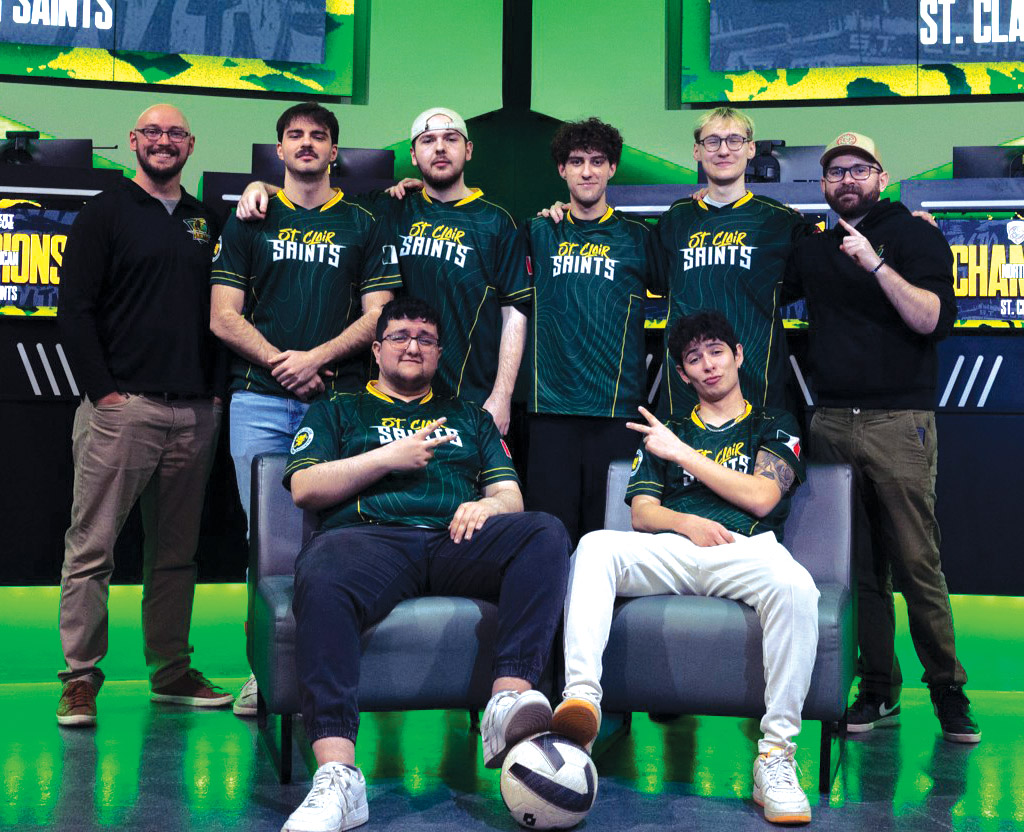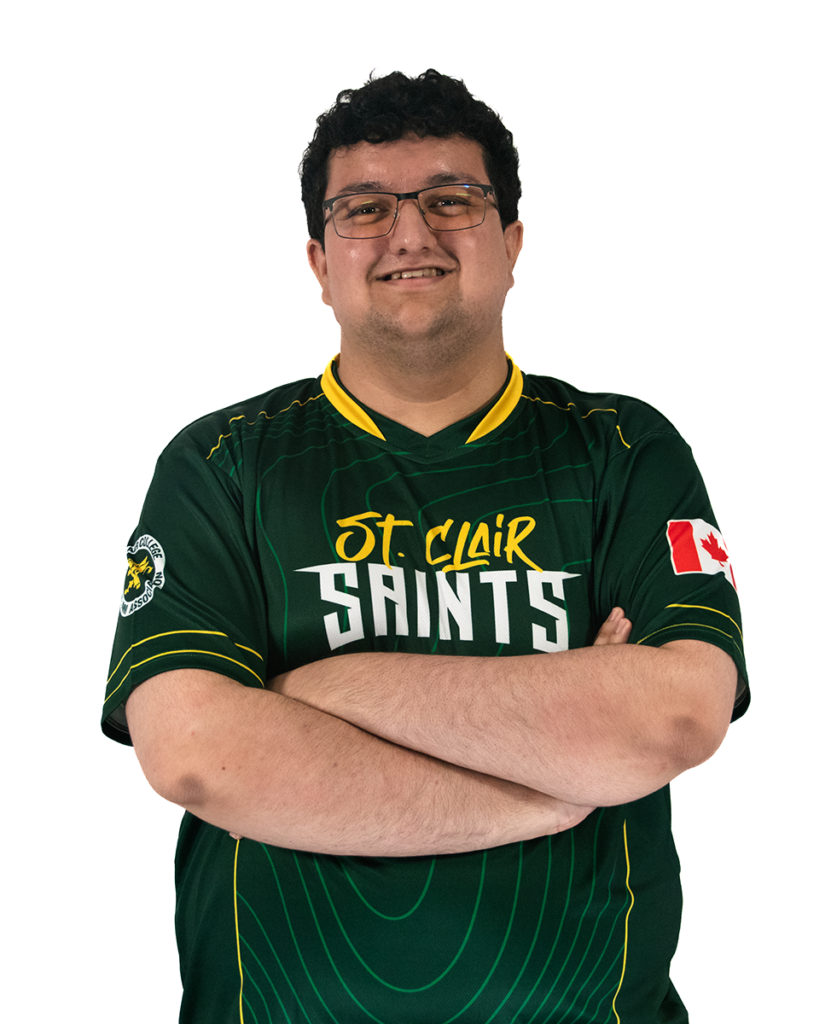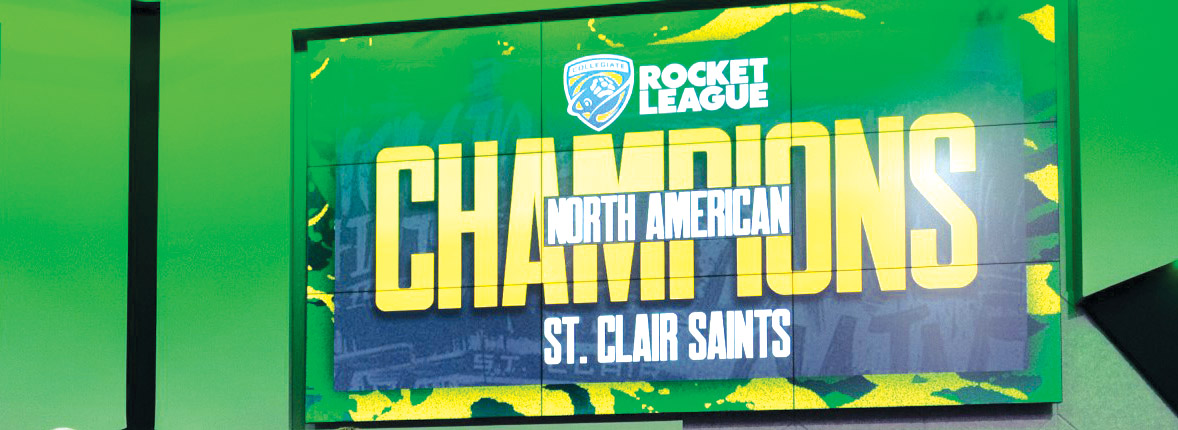Windsorite Leads Saints Esports
Team to National Championship
Story by Michael Seguin
Photography by Shane Thompson
We all have one. That first sporting event that made us lifelong fans. That first championship that made our hearts soar. That electric thrill circling the air as the two teams faced off. The climactic highs and the crushing lows. The ebb and flow of the competition. The breathless anticipation as the clock ran down. The incredible thrill as our team scored that final goal—securing a hard-won victory.
Now imagine those same emotions—those same thrills—only on a virtual plane.
Esports is a rising trend on the global stage. It involves teams of players competing for victory not atop a field or an ice rink—but within a video game. Players will compete using a variety of different games—the matches typically streamed over platforms like YouTube or Twitch. And while esports can trace its origins back to the early 1970s—it has only mushroomed in popularity during the past 10 years.

And now, the Saints—a local Collegiate Rocket League (CRL) team—has secured a major victory in the CRL Spring Championship, beating out over 250 schools across North America and Mexico.
The team is headed by Coach Yusuf “Thermalrex” Naebkhil—who is himself only 22-years-old.
“I’ve been a gamer ever since I was three years old,” Yusuf explains. “Ever since I was first handed a controller, I haven’t been able to put them down. Every day after school I would come home and game for hours and hours and hours.”
Yusuf first dabbled with esports through League of Leagues—a wildly popular multiplayer online battle arena game. However, he eventually found success with Rocket League.
But what is Rocket League? The game can best be described as “soccer in a car.” Six players are split into two teams—each driving a rocket-powered vehicle to try and knock a massive ball into the opposing team’s net. Although first released in 2015, the game still enjoys massive following and remains a popular choice for esports.
Yusuf was first introduced to Rocket League in 2018, when he saw a friend playing.
“We started dabbling with it,” Yusuf explains. “I’d never thought about going competitive with it back then. But once I got into the University of Windsor, I ended up joining their esports club.”
Yusuf started humbly enough—as the C team player. But his early signs of talents were difficult to ignore.
“Even when I was still a player, I ended up doing a lot of the scheduling,” Yusuf reports. “I coordinated a lot of the practice runs and game reviews. I sort of became the de facto Team Captain. And before long, the Assistant Esports Director saw how big Rocket League was getting and asked me to coach the varsity team.”

After University, Yusuf enrolled at St. Clair College and joined the Saints: their Rocket League team—first as a volunteer, then later as the Head Coach. The ensemble consists of Assistant Coach Luca “Shuffleverse” Paparatti, and Starters James
“Jazii” Janzen, Nicolas “Pzy” Steinhauser, Ario “Arju” Berdin. Tommaso “Barist” Battistoni also serves as a substitute player.
But what does a normal coaching session involve? Typically, the team would assemble an hour before scheduled training hours. After a bit of warming up, they would break into free play or scrimmages or ranking before the actual hard work begins.
“For individual training, we work on the essentials,” Yusuf explains. “Hitting the ball. In-game mechanics. Aerial maneuvers. Tighter handling of the vehicle. We need to make sure everyone’s skills are as sharp as possible. But team training is a different animal. We look at how we’re rotating. Where someone needs to be. How we can keep pressure on the ball. It’s all about making sure the team is working as a unit.”
Training sessions can last for hours. And again, the end goal is the same as any other sport: ensuring that everyone is reaching their highest potential.
“When you’re just playing casually, you often don’t care about the results,” Yusuf states. “You’re just trying to have fun. But when you’re playing competitively, you’re always trying to improve. Even when you don’t win, you take those losses as learning experiences. You’re always trying to be the best version of yourself in that game. We always make sure we’re not making any avoidable mistakes that could affect us during the series. Afterwards, we usually do a video review of the game to see where we can improve.”
After months of training, the Saints entered the Collegiate Rocket League (CRL) Championship.
And after several hard-won bouts, the team won the tournament—making them the first ever Canadian school to earn such a victory.
When asked to describe how earning such a title felt, Yusuf is characteristically humble.
“It was pretty unreal,” Yusuf explains. “Going in, my goal had always been to win a championship. To help my team secure the highest possible victory. But I didn’t expect to win! Especially not in my first year. But my goal was to be part of the first Canadian institution to win the CRL Championship.”
The video of the Saints winning the competition can be found on YouTube. And it is as ecstatic—as jubilant—as any other championship-winning sports team securing a victory. The players cry out, crowding around each other in a huddle. Yusuf himself stands at the center of it all—smiling ear-to-ear.
Yusuf credits his team with putting in the hard work necessary to defeat the competition.
“We’re lucky enough to have the best players in the world here at St. Clair College,” Yusuf states.
But what’s next for Yusuf and the Saints?
“We’re looking to cement a legacy,” Yusuf states. “And you never know! If CRL decides to bring back their now-defunct international division, then that’s going to be our new goal. But ultimately, we’re looking to keep improving and hopefully break into the professional scene.”
Published in the Summer 2025 edition.




Add comment